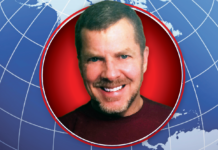By Will Carlin
It was early morning, and the stands at the Tournament of Champions in Grand Central Terminal were empty. Below the bleachers, despite echoes from the commuters on their way to work, it was fairly quiet. But the lone exercise bike was humming. Nick Matthew, known as the Wolf, was working out.
It was an off day for Matthew, but he had agreed to hit with some students from one of the urban squash programs in New York. He was getting ready. Though the young players wouldn’t show up for another forty-five minutes, Matthew was going through his normal pre-match limbering routine.
“Isn’t today an off day for you?” I asked him.
“Yeah, but I’m hitting with the kids in a little while.”
“And you’re doing all this to hit with kids?”
Matthew smiled and explained that he thought it was even more important to get the body ready before these kinds of hits. “You want to keep the ball in play so that they have some fun, but if the body isn’t warm, that’s just the kind of situation where you get hurt.”
That attention to detail and professionalism is part of what has made Matthew one of the most successful players in the history of the game. Matthew is retiring at the end of this season. To help honor Matthew’s twenty-year squash career, England Squash produced a forty-minute documentary called Becoming the Wolf: The Nick Matthew Story. The movie covers many of the reasons for Matthew’s success, but one story stands out. None of his huge achievements might have happened were it not for a courageous decision he made when he was eighteen.
Matthew had developed his unwavering mental toughness under the tutelage of his junior coach (and good friend of his father), Mark Hornby. This foundation was critical to Matthew’s success. But as confident as he was in his competitiveness and his fitness, he also knew that his strokes were not as effective as they should be. “They didn’t look that good, aesthetically,” Nick said.
He realized that he needed a change. “It was one of the most difficult decisions of my career,” he said. Hornby had travelled all over England with him. He practically was part of the family, and he was going to be crushed. Matthew pressed on. “I knew I had to make a clean break—to rip off the plaster. And it was tough because I knew that I was breaking his heart.”
He approached David Pearson, an England national coach, with whom he had worked with during junior national team training. Pearson was flattered because he knew Hornby and was impressed by the work he had done. But in his first session with the young Matthew, he was blunt: “We need to totally analyze your swing and your movement… and literally just change the whole package.”
Matthew was a little taken aback. He knew he needed to make some changes, but the entire thing? “Bear in mind I was top 100 in the world when I went under that change, and I was number one in the British juniors,” Matthew said.
But Pearson wasn’t alone in his assessment. “He couldn’t attack the backhand,” said England national coach, David Campion. “He was almost like a one-sided player; his backhand was very defensive… his accuracy was poor and his strength and power on the backhand weren’t great.”
“Look, Nick would always be a good player,” recounted Pearson. “Because he had that guts and determination, but would he ever have become world number one or got to the world top ten? It just wouldn’t have happened without a change in technique.”
It wasn’t easy.
“We spent hour after hour on a squash court,” Pearson said. “Totally taking down his movement and his swing from the point of the grip. You think that’s a beginner’s thing… We literally spent five years, I would say, and it was a complete change.”
“I got to the point where I physically couldn’t hit the ball,” described Matthew. “There were times when I had a session with DP where I tried to hit the ball, and it just went into the lights.It was a long journey at times, especially with your ego. You start losing to people that you were beating before because you have to go backwards before you can go forwards. It was a bit of a wrench. Best thing I’ve ever done. Hardest. But best.”
In the documentary, Matthew mentions many of the people who helped him along the way, from longtime British national team physio Jade Leeder to Mark Campbell, his strength and conditioning trainer. His coaches have included Hornby, Pearson and Campion, of course, but also Chris Robertson, former world No. 2 and England head coach.
When Matthew plays his last match in his last professional tournament later this spring, he will look out at his mother and father, at his wife and young daughter, and at the people he cites in the documentary, most of whom will be in attendance. He will thank them, and he’ll say a few words.
Just before he leaves, while he stands at the door, he might take one last look back at the court and acknowledge someone else: the man who, while still a teenager, made the toughest decision of his career; the man who took three steps back hoping that it would lead to big giant step forward; the man who persevered for years to see it all pay off.
The man who became the Wolf.


